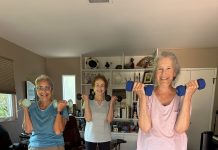Driving down San Joaquin Hills Road, I always look forward to the spectacular view of Newport, the beautiful blue ocean winking at me while the peninsula lazily sits in its gentle wake.
But today, a brownish whispy layer of smog covered the whole coast down below, leaving just the highest points of Catalina peaking out of the brown mist.
It’s these moments that remind me even though I don’t smoke, I’m inhaling a bunch of crud anyway.
With the end of December just days away, understanding the importance of fresh air is a good lead in for the year coming up. Our breathing is vital, as we no doubt realize after choking on a stray bit of food as the air becomes blocked.
Despite all the atoms and molecules roaming around in clean air – nitrogen, oxygen, argon, carbon dioxide, neon, helium, methane krypton, hydrogen, xenon and water vapor – not clean air outside can also contain particulates such as soot, smoke, pollen, dust from soil and ozone.
Inside air contributes its own pollution with mold, dander (flakes of skin), and microscopic fibers from clothes or any kind of material, synthetic or not. But from all the clean air chemicals, it is oxygen that we need, about 21% found roaming in the air.
Oxygen ignites our cells with energy so we can walk, talk and live life. Lung health is rarely taken into account unless a disease has taken hold. So gathering good resolutions needs to incorporate the power and vulnerability of each breath we take in order to keep the breath of life flowing.
One aspect we can control is the interior of the home where HEPA filters and regular cleaning keeps all annoying particulates in reasonable amounts. But we must live outdoors as well, so the best way forward is to take care of those lungs as best as possible.
For those that smoke, don’t. If there is anything to do for any part of health, it would be to stop smoking. Those that have stopped or never smoked, there are other factors to think about.
On average, the human lung capacity is about 6 liters of air, yet most people inhale much less due to shallow breathing, or chest breathing. If this is all the breathing that is done, stagnant air and pollutants accumulate in the depths of the lungs that might cause unwanted fatigue, and respiratory problems.
Air that fails to clear out of the lungs remains in the tissues and becomes stale and stops fresh oxygen from entering the bloodstream. Deep rhythmic breathing expands the diaphragm muscle and the bundles of alveoli that make up air pockets within the lungs which allows for more oxygenation of the cells within the body.
Swimming, running, biking or any active sport forces us to take deep breaths by pushing our physical limits for more oxygen and is very beneficial to lung health.
Also, eating a healthy diet of omega-3 fatty acids found in fatty fish and walnuts, vitamin A in apricots and antioxidants from broccoli to berries enrich the lungs with vibrancy. Pure clean water keeps blood flowing through the lungs as it grabs oxygen and releases carbon dioxide. And keeping the lungs hydrated allows mucus to flow at the perfect consistency to capture and eliminate foreign and toxic particles out of the body.
Breathing is the ultimate gift we give ourselves approximately 17,000 times a day. We can go several months without food, about a week without water, but only 3-4 minutes without breathing.
Bring in the New Year with a joyful breath, and keep the inhales and exhales of life moving brightly in 2014 with healthy lungs.
Happy New Year!
Contact Gina at Ima_gina_tion@yahoo.com.




